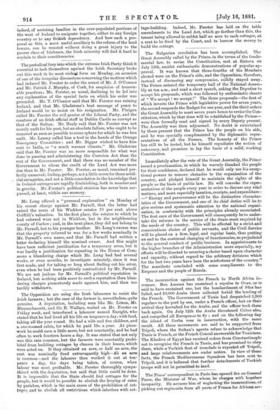The Opposition are using the Irish labourers to resist the
Irish farmers ; but the case of the former is, nevertheless, quite genuine. A deputation, including men like Mr. Litton, Mr. Blennerhassett, and Sir R. Wallace, waited on Mr. Forster on Friday week, and introduced a labourer named Enright, who stated that he had lived all his life on tenpence a day, with food, taking all the year round. He had a wife and five children, and a one-roomed cabin, for which he paid 18s. a year. At piece- work he could earn a little more, but not constantly, and he had often to work fourteen hours a day. It was stated that not only was this rate common, but the farmers were constantly prohi- bited from building cottages by clauses in their leases, which were acted on. If they obtained an acre, or half an acre, the rent was nominally fixed extravagantly high—R5 an acre, is common—and the labourer then worked it out at ten- pence a day, the days being taken, of course, when labour was most profitable. Mr. Forster thoroughly sympa- thised with the deputation, but said that little could be done. It is impossible that the State Should find cottages for the people, but it would be possible to abolish the levying of rates, by parishes, which is the main.cause of the prohibition of cot- tages, awl 'to abolish all -restrictions which interfere with cot-
tage-bnilding. Indeed, Mr. Forster has laid on the table amendments to the Land Act, which go farther than this, the tenant being allowed to sublet half an acre to each cottager, at. a rent to be fixed by the Court, and to borrow the money to build the cottage.


































 Previous page
Previous page